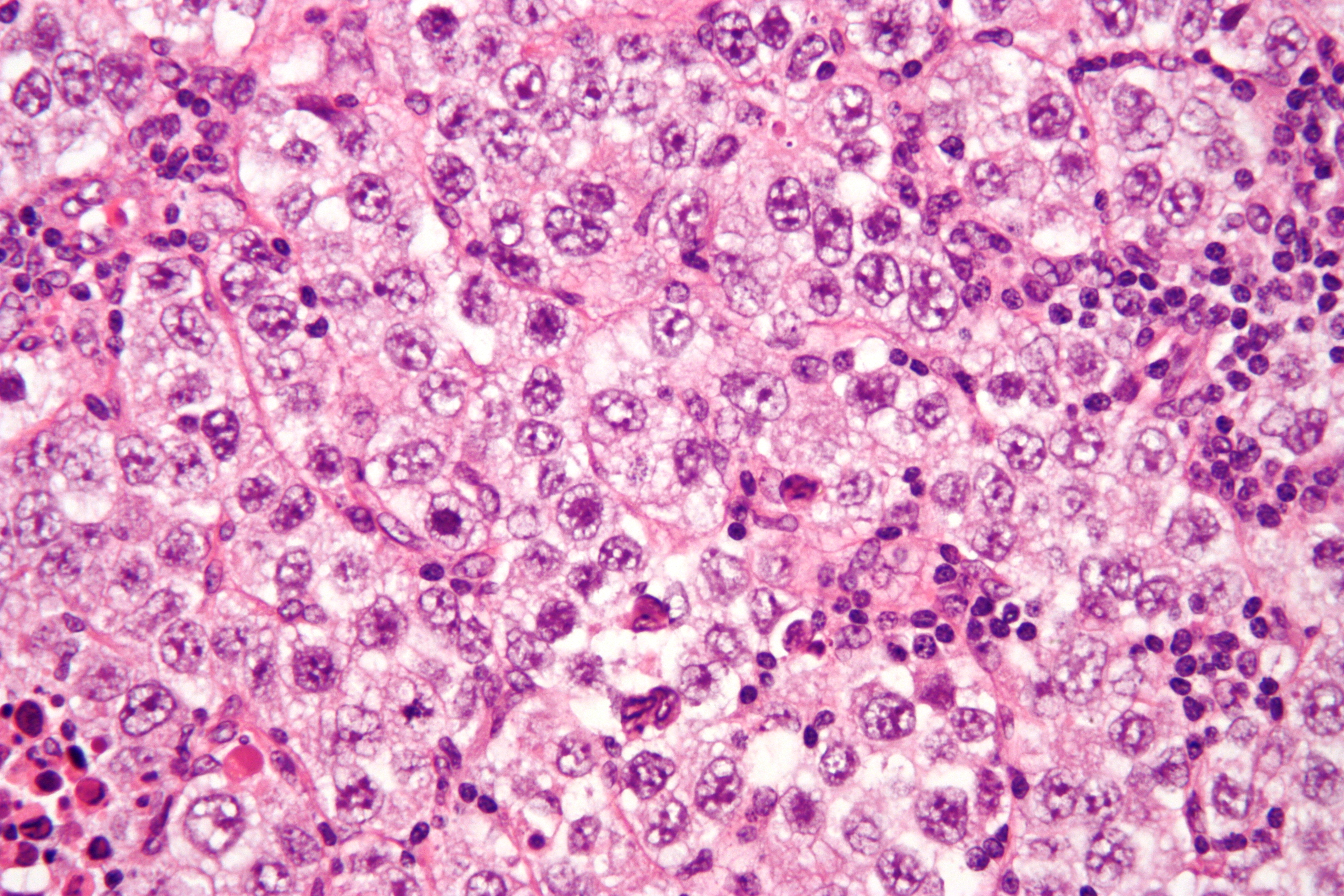Germ cell tumor
(Redirected from Teratocarcinoma)
Editor-In-Chief: Prab R Tumpati, MD
Obesity, Sleep & Internal medicine
Founder, WikiMD Wellnesspedia &
W8MD medical weight loss NYC and sleep center NYC
| Germ cell tumor | |
|---|---|

| |
| Synonyms | N/A |
| Pronounce | N/A |
| Specialty | N/A |
| Symptoms | Abdominal pain, testicular swelling, dyspnea |
| Complications | Infertility, metastasis |
| Onset | Typically in young adults |
| Duration | Variable |
| Types | Seminoma, non-seminomatous germ cell tumor |
| Causes | Genetic factors, cryptorchidism |
| Risks | Family history, Klinefelter syndrome |
| Diagnosis | Biopsy, tumor markers |
| Differential diagnosis | Lymphoma, testicular torsion |
| Prevention | None specific |
| Treatment | Surgery, chemotherapy, radiation therapy |
| Medication | Cisplatin, bleomycin, etoposide |
| Prognosis | Generally good with treatment |
| Frequency | Rare |
| Deaths | N/A |
A germ cell tumor (GCT) is a type of neoplasm derived from germ cells. Germ cells are the reproductive cells of the body, and they are responsible for the production of spermatozoa in males and ova in females. Germ cell tumors can occur in the gonads (testes and ovaries) or in extragonadal sites such as the mediastinum, retroperitoneum, and the central nervous system.
Classification[edit | edit source]
Germ cell tumors are classified into two main types: seminoma and non-seminomatous germ cell tumors (NSGCTs).
Seminoma[edit | edit source]
Seminomas are a type of germ cell tumor that tend to grow slowly and are sensitive to radiation therapy. They are most commonly found in the testes but can also occur in extragonadal sites.
Non-seminomatous germ cell tumors[edit | edit source]
NSGCTs include a variety of tumor types such as embryonal carcinoma, yolk sac tumor, choriocarcinoma, and teratoma. These tumors tend to be more aggressive than seminomas and may require a combination of surgery, chemotherapy, and radiation therapy for treatment.
Epidemiology[edit | edit source]
Germ cell tumors are most commonly diagnosed in young adults, particularly between the ages of 15 and 35. They are more common in males than females, with testicular germ cell tumors being the most prevalent type in men.
Pathophysiology[edit | edit source]
Germ cell tumors arise from germ cells that fail to undergo normal differentiation and maturation. The exact cause of this abnormal development is not fully understood, but it is believed to involve a combination of genetic and environmental factors.
Clinical presentation[edit | edit source]
The symptoms of germ cell tumors vary depending on the location and type of the tumor. Testicular germ cell tumors often present as a painless mass in the testicle, while ovarian germ cell tumors may cause abdominal pain or swelling. Extragonadal germ cell tumors can cause symptoms related to the compression of nearby structures.
Diagnosis[edit | edit source]
Diagnosis of germ cell tumors typically involves a combination of imaging studies, serum tumor markers, and biopsy. Common tumor markers include alpha-fetoprotein (AFP), beta-human chorionic gonadotropin (β-hCG), and lactate dehydrogenase (LDH).
Treatment[edit | edit source]
The treatment of germ cell tumors depends on the type, stage, and location of the tumor. Seminomas are often treated with radiation therapy, while NSGCTs may require chemotherapy and surgical resection.
Prognosis[edit | edit source]
The prognosis for germ cell tumors is generally favorable, especially when detected early. Seminomas have a high cure rate with appropriate treatment, and many NSGCTs can also be successfully treated.
See also[edit | edit source]
| Germ cell tumors | ||||
|---|---|---|---|---|
|
Search WikiMD
Ad.Tired of being Overweight? Try W8MD's physician weight loss program.
Semaglutide (Ozempic / Wegovy and Tirzepatide (Mounjaro / Zepbound) available.
Advertise on WikiMD
|
WikiMD's Wellness Encyclopedia |
| Let Food Be Thy Medicine Medicine Thy Food - Hippocrates |
Translate this page: - East Asian
中文,
日本,
한국어,
South Asian
हिन्दी,
தமிழ்,
తెలుగు,
Urdu,
ಕನ್ನಡ,
Southeast Asian
Indonesian,
Vietnamese,
Thai,
မြန်မာဘာသာ,
বাংলা
European
español,
Deutsch,
français,
Greek,
português do Brasil,
polski,
română,
русский,
Nederlands,
norsk,
svenska,
suomi,
Italian
Middle Eastern & African
عربى,
Turkish,
Persian,
Hebrew,
Afrikaans,
isiZulu,
Kiswahili,
Other
Bulgarian,
Hungarian,
Czech,
Swedish,
മലയാളം,
मराठी,
ਪੰਜਾਬੀ,
ગુજરાતી,
Portuguese,
Ukrainian
Medical Disclaimer: WikiMD is not a substitute for professional medical advice. The information on WikiMD is provided as an information resource only, may be incorrect, outdated or misleading, and is not to be used or relied on for any diagnostic or treatment purposes. Please consult your health care provider before making any healthcare decisions or for guidance about a specific medical condition. WikiMD expressly disclaims responsibility, and shall have no liability, for any damages, loss, injury, or liability whatsoever suffered as a result of your reliance on the information contained in this site. By visiting this site you agree to the foregoing terms and conditions, which may from time to time be changed or supplemented by WikiMD. If you do not agree to the foregoing terms and conditions, you should not enter or use this site. See full disclaimer.
Credits:Most images are courtesy of Wikimedia commons, and templates, categories Wikipedia, licensed under CC BY SA or similar.
Contributors: Prab R. Tumpati, MD


